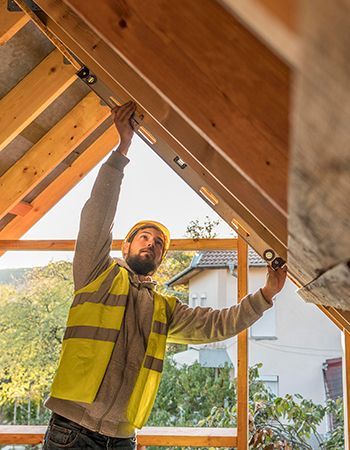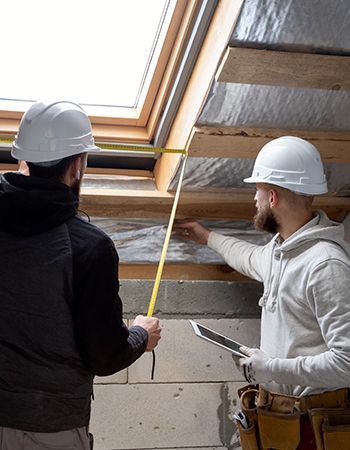CALL US TODAY! (608) 330-3626 OR (608) 530-5323
CALL US TODAY! (608) 330-3626
Insulation Services in Janesville, WI
At Weatherseal Insulation and Roofing, we understand that a high-quality installation is the key to a durable, long-lasting roof. That's why we offer a full range of installation services for all types of roofing materials and designs. Our team of experienced professionals is dedicated to providing you with top-quality workmanship, exceptional customer service, and the peace of mind that comes with knowing your roof is in good hands.
Whether you're building a new home or business, or need to replace an old or damaged roof, we'll work with you to create a custom installation plan that meets your specific needs, budget, and design preferences. We use only the highest-quality materials and cutting-edge techniques to ensure that your roof is installed to the highest standards of excellence.


Keep Your Property Comfortable and Energy-Efficient with Our Insulation Services in Janesville, WI
We understand that proper insulation is essential to maintaining a comfortable and energy-efficient home or business. That's why we offer a full range of insulation services designed to meet all your needs, from minor repairs to complete installations.
Our team of experienced professionals will work with you to identify areas of your property that may be costing you money in energy bills, and provide you with cost-effective solutions to improve your overall energy efficiency. We use only the highest-quality insulation materials and cutting-edge techniques to ensure that your property stays comfortable and energy-efficient throughout the year.


Keep Your Property Comfortable and Energy-Efficient with Our Insulation Services
At Weatherseal Insulation and Roofing, we understand that proper insulation is essential to maintaining a comfortable and energy-efficient home or business. That's why we offer a full range of insulation services designed to meet all your needs, from minor repairs to complete installations.
Our team of experienced professionals will work with you to identify areas of your property that may be costing you money in energy bills, and provide you with cost-effective solutions to improve your overall energy efficiency. We use only the highest-quality insulation materials and cutting-edge techniques to ensure that your property stays comfortable and energy-efficient throughout the year.
Improve Your Property's Energy Efficiency with Our High-Quality Window and Door Installations
Our energy-efficient solutions are designed to save you money on your energy bills, improve your property's insulation, and enhance your overall comfort and safety. At Weatherseal Insulation and Roofing, we have the expertise and experience to help you achieve the best possible results for your property. Whether you need insulation installation, roofing repairs, or other services, we're here to help you protect your home or business with top-quality solutions that you can trust.
We Specialize in:
- Metal Roofing tear offs/installs and repairs
- Rubberroofing tear offs/installs and repairs
- Asphalt roofing tear offs/installs and repairs
- New build roof plans
- Seal costing and weatherizing services
- Energy saving options available we work with Focus On Energy
FAQ
-
Benefits of cleaned cell spray foam insulation
Closed cell spray foam insulation has several benefits over other types of insulation. It is a powerful insulator that works better than any other options because of its expansive nature, allowing it to tightly seal all nooks and crannies effectively. It has an R-value per inch of 7. the highest on the market'. It also serves as an incredible energy saver and can help reduce energy bills by up to 50%. Closed call spray foam insulation provides an air-tight seal that prevents air leakage and maintains an even temperature throughout the structure. It also serves as a moisture barrier and deters mold 1 " Closed cell spray foam insulation has a long life span and is eco-friendly.
-
How does closed cell spray foam insulation compare to other types of insulation?
Closed cell spray foam insulation has several advantages over other types of insulation. It is watertight, while other types can be damaged by moisture. Closed cell foam insulation is thicker compared to other types and has a higher R-Value of about 6-7 per inch, making it better at keeping the heat in or out of your building. Open cell foam insulation is lightweight, pliable, and easy to work with, whereas closed cell foam is rigid and very dense. It comes down to understanding the benefits of open cell vs closed cell foam and choosing the type that fits your needs
-
What is R-value in insulation
R-value is a measure of how much resistance insulation has to heat flow. The higher the R-value, the better the insulation is at resisting heat flow, Insulation materials with higher R-values generally cost more than those with lower R-values R-value is calculated based on the thickness of the insulation and its thermal conductivity. Thicker insulation has higher thermal resistance and lower thermal conductivity
-
What are some common types of installation?
There are several types of insulation, including fiberglass, cellulose, spray foam, and rigid foam. Fiberglass is the most common type of insulation and is made from glass fibers. Cellulose insulation is made from recycled paper products and treated with fire retardants. Spray foam insulation is made from polyurethane and is sprayed into place. Rigid foarn insulation is made from polystyrene or polyurethane and comes in large sheets.
-
What is the material in soy based spray foam?
Soy-based foam Insulation is different from other more traditional spray foams because it is partly made from renewable soybean oil, making it more environmentally friendly and a "green" alternative to regular SPF insulation 2. All spray polyurethane foam (SPF) insulation is created by mixing isocyanate and polyol resin. When these two organic compounds come into contact during the application process, they react to form a durable, long-lasting insulation material. Soy-based foam
insulation is partly made from renewable soybean oil
-
Advantages of soy based spray foam insulation
Soybean foam insulation has several key benefits that will make any homeowner happy. Here are some of them:
• Reduces Energy Costs: While petroleum is the primary material in soybean foam insulation, soybeans make up a significant chunk of the material. All spray-foam Insulation, including soy- based, can help homeowners dramatically reduce their energy bills 2
Ju Ask me anything.
resistance, and less toxic chemicals
• Doesn't include Harmful Chemicals: This type of insulation doesn't contain formaldehyde, urea, hydrofluorocarbons or other harmful chemicals
-
What are some benefits of any-based spray foam insulation?
Soybean foam insulation has several key benefits that will make any homeowner happy
some of them:
Here are:
• Reduces Energy Costs: While petroleum is the primary material in soybean foarn insulation, soybeans make up a significant chunk of the material. All spray-foam insulation, including soy
based, can help homeowners dramatically reduce their energy bills".
Doesn't Include Harmful Chemicals: This type of insulation doesn't contain formaldehyde, urea, hydrofluorocarbons, or other harmful chemicals.
- Superior Insulation: The benefits of this product include superior insulation, better moisture resistance, and less toxic chemicals!
- Eco-Friendly: Soy-based insulation is greener than other insulation material because soy is a renewable resource
-
What is the diffrence between closed call spray foam insulation ads open cell spray foam?
The main difference between open-cell and closed-cell spray foam insulation is their density and R- value. Open-cell spray foam has a lower density and R-value than closed-cell spray foam. Closed-cell spray foam has a higher density and R-value than open-cell spray foam. Open-cell spray foam is less expensive than closed-cell spray foam. It's also more flexible and can beused in more applications. However, it's not as effective as
closed-cell spray foam at insulating against moisture and air infiltration.Closed-cell spray foam is more expensive than open-cell spray foam. It's also more rigid and can be used in fewer applications. However, it's more effective at insulating against moisture and air infiltration than open-cell spray foam.
Open-cell spray foam has several benefits:
• Lower Cost Open-cell spray foam is less expensive than closed-cell spray foam.
-
What are some benefits of open cell spray foam insulation?
• Sound Dampening: Open-cell spray foam can help reduce noise transmission.
Flexibility: Open-cell spray foam is more flexible than closed-cell spray foam and can be used
in more applications -
What are some benefits of open cell spray foam insulation?
Open-cell spray foam has several benefits:
• Lower Cost: Open-cell spray foam is less expensive than closed-cell spray foam. • Sound Dampening: Open-cell spray foam can help reduce noise transmission.
• Flexibility: Open-cell spray foam is more flexible than closed cell spray foam and can be used in more applications.
• Vapor Permeability: Open-cell spray foam allows water vapor to pass through it, which can help prevent moisture buildup.
-
What are some disadvantages of open cell spray foam insulation?
Open-cell spray foam has some disadvantages:
• Lower R-Value: Open-cell spray foam has a lower R-value than closed-cell spray foam, which means It's not as effective at insulating against moisture and air infiltration.
• Water Absorption: Open cell spray foam can absorb water, which can lead to mold growth and other problems if it's not installed correctly.
Not Ideal for Outdoor Use: Open-cell spray foam isn't ideal for outdoor use because it can absorb
water and degrade over time.
Closed-cell spray foam has some disadvantages:
- Higher Cost: Closed-cell spray foam is more expensive than open-cell spray foam.
- Rigid: Closed-cell spray foam is more rigid than open-cell spray foam and can be used in fewer applications not ideal for large Areas:
- Closed-cell spray foam isn't ideal for large areas because it can expand too much and cause problems.
-
How long does the benefits of spray foam eknied cell fas!?
The benefits of closed-cell spray foam can last for a long time if it's installed correctly and maintained properly. The lifespan of closed-cell spray foam depends on several factors, including the quality of the installation, the thickness of the application, and the environmental conditions.
-If closed cell spray foam is stalled property how long does its enefits last?
The lifespan of closed-cell spray foam depends on several factors, including the quality of the installation, the thickness of the application, and the environmental conditions. If it's installed correctly and maintained properly, the benefits can last for a long time.
-
Whit are the benefits of insulation your basement?
insulating your basement has several benefits. Here are some of them:
• You can lose less heat and save money on energy bills by blocking the airflow that can allow cool or warm air in, depending on the time of year! 2.
Insulating your basement walls can increase resale value *.
• Insulating the basement allows you to use it as a living space
- Lowering moisture levels by insulating your basement walls can help prevent mold growth and protect against water damage.
- Insulating your basement walls can also help keep the heat in and no longer deal with cold, concrete walls?
-
Will save money on bills for institutiong my basement?
Yes, you can save money on your energy bills by insulating your basement walls. According to Energy Star, homeowners can save an average of 15% on heating and cooling costs (11% of total energy costs) by adding insulation in attics, crawl spaces, and basement rim joists. For most folks, that's about $200 in savings per year. In colder parts of the country, like climate zones six and seven, savings increases up to 20%
-
What as the pros and cons of insulating my attic
There are pros and cons to insulating your attic. According to Forbes Home, some pros of insulating your attic include that no machine rental is necessary, it's easy to judge death and R-value of insulation, and it's easier to remove and replace later on if necessary. Some cons include that all insulation must be physically hauled to attic, it's more difficult to work around obstructions than with loose-fill insulation, and there's more physical contact with the insulation than by blowing in
-
What are some common matesels used for insulating attent
There are several materials that can be used to insulate an attic. Some common materials include fiberglass batts, blown in cellulose, and spray foam insulation.
-
Pros and cons of fiberglass insulation?
Fiberglass insulation is a popular choice for insulating attics. Some pros of fiberglass insulation include that it's relatively inexpensive, easy to install, and can be used in a variety of applications. Some cons include that it can be irritating to the skin and lungs if not handled properly, and it can lose its effectiveness over time if it becomes wet or compressed.
-
Pros and cons of cellulose insulation?
Cellulose insulation is another popular choice for insulating attics. Some pros of cellulose insulation include that it's made from recycled materials, it's relatively inexpensive, and it can be used in a variety of applications. Some cons include that it can settle over time, which can reduce its effectiveness, and it can be a fire hazard if not treated with fire retardants. I hope this helps! Let me know if you have any other questions.
-
Pros and cons of insulating my garages
There are pros and cons to insulating your garage. Some pros include that it can help keep your garage warmer in the winter and cooler in the summer, which can help reduce energy costs. It can also help reduce noise from outside and make your garage more comfortable to work in. Some cons include that It can be expensive to install, and it may not be necessary if you don't spend much time in your garage I hope this helps! Let me know if you have any other questions.
-
What is retro fit insulating?
Retrofit insulation is insulation that is installed in an existing home or building. It can be used to improve the energy efficiency of a home or building by reducing heat loss and lowering energy bills.
-
What is retro insulating?
Retrofit insulation is insulation that is installed in an existing home or building. It can be used to improve the energy efficiency of a home or building by reducing heat loss and lowering energy bills.
-
How do you do retrofit insulation?
The process for retrofitting insulation can vary depending on the type of insulation and the area of your home or building that you want to insulate. However, one common method is to use the blow fill technique, which involves blowing loose fibers into the wall cavity through a series of access holes! This method can be used for retrofitting wall insulation and is relatively easy and non-invasive
-
Can spray foam be used for retrofit Insulation?
Yes, spray foam can be used for retrofit insulation. In fact, it has become popular as a retrofit for existing homes and to insulate new green homes. However, it is not a cure-all and may not be the
best solution for every situation.
-
How to insulate a cinder block building?
Yes, you can insulate a cinder block building. The simplest and most affordable method of insulating the interior of a block wall is to install rigid foam board insulation. Available in large, three-by-five or four-by-eight sizes, the panels are lightweight and held in place with special foam-safe glue. The panels alone are suitable for covering the insides of garage or crawl space walls.
Other options for insulating concrete block walls include spray foam insulation, injection foam insulation, polystyrene beads, foam boards, and loose-fill masonry insulation. The material available to use depends on whether the walls will be covered or if the top of the wall is exposed If you intend to live in the room, one way to insulate the block wall is to build the wall out with furring strips and then insulate between them. The process is similar to framing a standard wall, except the wall studs typically fit flat along the block wall.
-
Should I insulate a porch?
Insulating a porch ceiling is a good idea as it offers numerous benefits. If your porch ceiling and the living room ceiling are on a level plane and connected, insulating the porch ceiling is a step you can consider. Additionally, if you have an enclosed porch a 3-season porch, or a sunroom, you should invest in insulating the porch ceiling.
In terms of energy savings, there isn't much benefit to insulating an unheated porch. However, doing so will prevent cold air from seeping into the porch and may allow you to use the porch for a few weeks longer before winter arrives If you want to install insulation on your porch celling yourself, it is cost-effective. But, it depends on a few factors, for example, the type of insulating material you use. Some insulations like spray foam insulation are easy to install by yourself
FREE ESTIMATES AVAILABLE!
Call, Text, or Email For More Information
We will get back to you as soon as possible
Please try again later
Your roof is one of the most important investments you'll make for your property. Make sure it's done right with Weatherseal Insulation and Roofing.
Get in Touch Today
Professional, dependable, affordable—why wait? If you need quality work from a qualified roofer, we are the company to call. We’ve helped countless clients keep their property protected while saving time and money. We know we can do the same for you too.
Hours of Operation
- Mon - Thu
- -
- Friday
- -
- Sat - Sun
- Appointment Only
Emergency Service
All Rights Reserved | Weatherseal Insulation and Roofing, LLC




